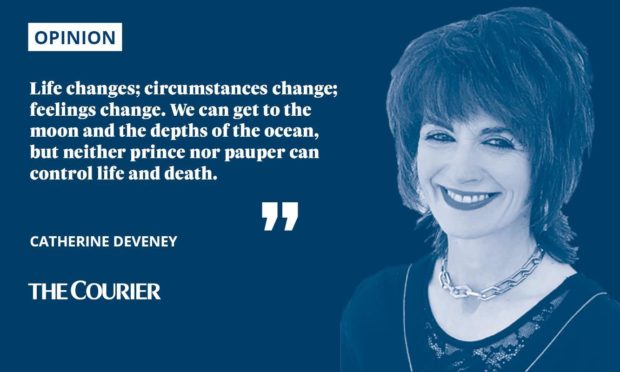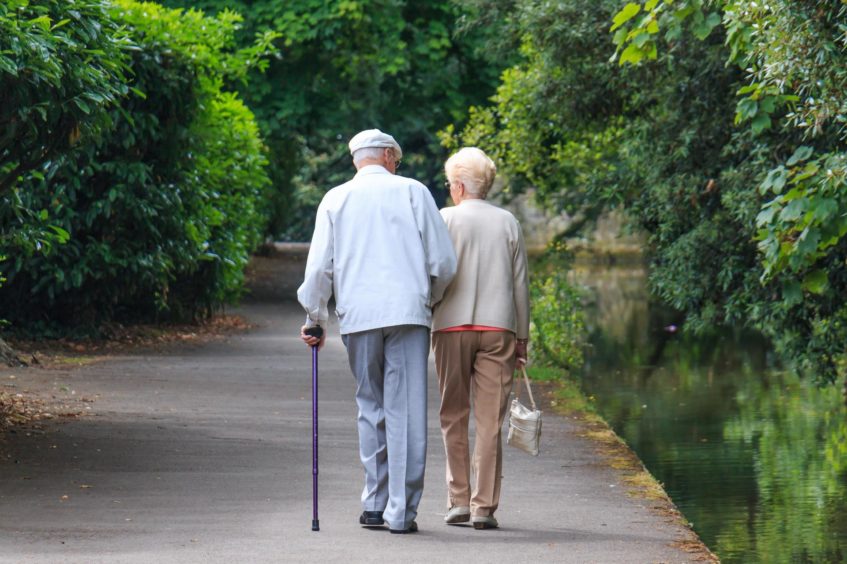Over breakfast, I am reading about two bereaved families.
One is royal but I am drawn to the other: a woman with elderly parents, both of whom wanted control over their own deaths. No ventilators; no heroics.
At first I skim read because, truthfully, I am not in the frame of mind to absorb the sadness, but the writer reels me into her life so skilfully, that I am left gasping at the end of her rod like a hooked fish.
Her parents, blighted by cancer, Parkinson’s and dementia, are like the frail figures on road signs, bent double over sticks, vulnerable to any icy blast and yet together, indomitable to the end. And on they go.
The years rolls back. My parents are alive again. I am driving them across the motorway.
I am puzzled all these years later that my mother is in the back seat. Why is she there? She point blank refused to travel anywhere other than the front.
But today, the Duchess is sitting close to my father. He has cancer; she has Parkinson’s.
As the traffic whizzes by, he says to her, so wistfully that my eyes flick instantly to the mirror: “Wouldn’t it be wonderful to be certain of another few years of life?”
“Even one year,” he concludes quietly. In the mirror, I see my mother’s head drop onto his shoulder. I switch lanes, breathless with silent pain.
As the sand runs through the egg timer, the depth of understanding, the urgency of understanding, gets ever more intense
I was young enough then that a year of life was, to me, a terminal diagnosis. To him, it was a priceless gift. It made me – temporarily – reappraise my relationship with time, but 20 years later I realise that the insight I had that day was limited.
And if I am lucky enough to live another 20, I suspect I will feel that my insight today is limited too. As the sand runs through the egg timer, the depth of understanding, the urgency of understanding, gets ever more intense.
Lucky enough. For life is partly luck, is it not? Not even royal power extends to life’s most important things.
They plough on
The writer’s parents struggle even more to be heard. When her mother is admitted to hospital, the writer receives a phone call outlining treatment for sepsis. That is not the plan, she says.
The doctor is surprised, says her mother is bright and co-operative, so they will plough on. Mistakes – deliberate and accidental – happen.
This month, there was justifiable anger about Do Not Resuscitate orders being automatically issued to people with learning disabilities during the Covid pandemic.
A broken heart
The writer feels like a murderer but her GP understands, alerting the hospital to the plan. Which is fine except her mother doesn’t die. Not then, anyway.
She recovers from sepsis but contracts Covid in hospital. Then she dies. Her husband also contracts Covid. He dies. Of a broken heart, his daughter says.
All of which reminds me of someone I knew who lost their limbs. In advance, they would have said they wouldn’t want to live. But when it came to it, they did.
None of this is an argument against advance plans, but more an observation that absolute control is an illusion; an expectation in modern life that cannot possibly be fulfilled, no matter how much we demand it.
Recent research from Oxford University suggests the vast majority of people across class, income and political spectrums support assisted dying.
A recent Populus poll found 82% of people want the law to give terminally ill patients more choice. Clearly, communication about advance plans would require more rigour. But perhaps, too, our expectations would need to be more flexible.
Life changes; circumstances change; feelings change. We can get to the moon and the depths of the ocean, but neither prince nor pauper can control life and death.
Time is precious
Despite initial reluctance, I read the article twice, the sadness mitigated by three positives.
The first was a reminder of the preciousness of time. The second, an appreciation of parents – whatever their social status – and a recognition of the pillars they establish in our lives. And the third was the sheer power of love.
The writer for her parents. Her parents for her. Her parents for each other. Even the doctor who wanted to heal, despite any advance plan, was motivated by a kind of love.
Ultimately, I realised the lesson here was not just about dying well but about living well and loving well – and that is the bit that is entirely in our control.
Catherine Deveney is an award-winning investigative journalist, novelist and television presenter


